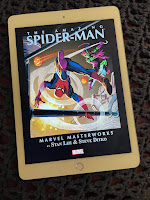
Originally appearing as a 13-part comic book limited series in the late 1990's, Batman: The Long Halloween is an epic, involving tale set during the early career of the caped crusader. Writer Jeph Loeb and artist Tim Sale tell a story that skillfully combines Batman's colorful rogues gallery (Joker, Riddler, Catwoman, etc.); more realistic criminal elements (in the form of warring gangster factions); and a terrific whodunit (who is the mysterious killer known as "Holiday"?). It all results in a wonderfully immersive story and hundreds of pages of gorgeous, moody artwork.
By the way, many of the story elements and set pieces of Batman: The Long Halloween inspired sequences- sometimes pretty directly- in Christopher Nolan's "Dark Knight" films, and Mr. Nolan acknowledges his debt to this story in the collection's forward. In any event, I'm glad I finally took the time to discover this little epic by Mr. Loeb and Mr. Sale, and look forward to soon moving onto Dark Victory, their sequel of sorts to Batman: The Long Halloween.
Batman: The Long Halloween is available in both print and Kindle editions.




















